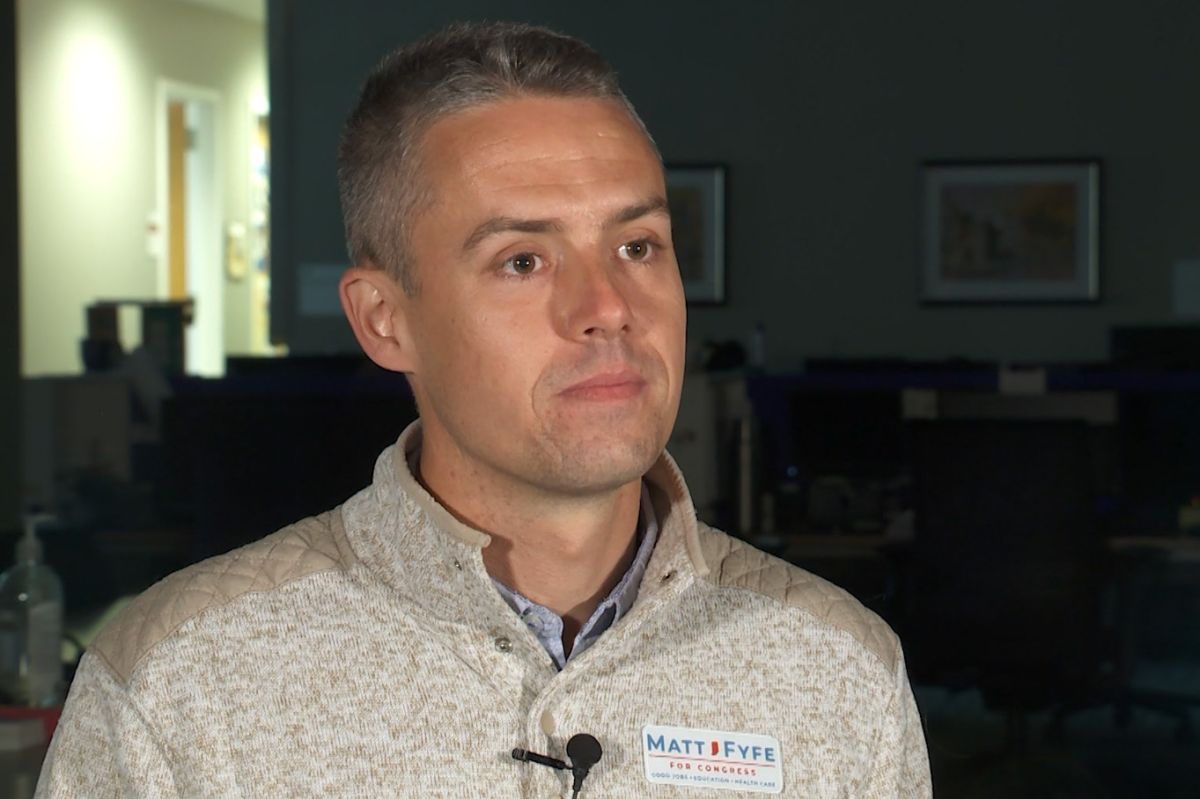
Matt Fyfe, Democrat candidate for Indiana's 9th Congressional District. Fyfe is a math teacher at Bloomington High School North. (Devan Ridgway, WFIU/WTIU News)
As part of WTIU/WFIU News’ 2022 election coverage, reporter Holden Abshier invited the three candidates running for Indiana’s 9th Congressional District to discuss their policy positions.
The three candidates are Tonya Millis, Libertarian and real estate broker from Mitchell; Matt Fyfe, Democrat and high school math teacher from Bloomington; and Erin Houchin, former Republican state senator from Salem.
Indiana’s 9th District consists of 17 and one-third counties: Brown, Clark, Dearborn, Decatur, Floyd, Franklin, Harrison, Jackson, Jennings, Jefferson, Lawrence, Monroe, Ohio, Ripley, Scott, Switzerland, and Washington counties, with part of southern Bartholomew County.
The conversation with Tonya Millis can be found here.
The conversation with Erin Houchin can be found here.
This conversation has been edited for clarity and conciseness.
Holden Abshier: How did you get involved in politics?
Matt Fyfe: My first-year teaching, we were told that we had to raise test scores, otherwise, we'd all get fired. And we did, which was a policy success, right? But we did at the expense of music classes, we spent money on calculators - like tens of thousands of dollars - and we cut things like credit card units that actually gave students what I think would be really valuable knowledge after high school. And that policy success didn't feel like a success for students, to me. And I think that got me on the path interested in politics, in general, and these policies that don't seem to be written for everyday people. I’m also a leader in my union and I think recently, some of the attitude of “you can be the one to make change, you can be the one to organize,” has really gotten into me.
HA: I'm curious as to why you decided to run in the 9th District and if redistricting factored into that decision at all?
MF: I started before the redistricting efforts, actually. I decided to run in the 9th District because I do see these federal policies, particularly in education - I think that's kind of my strong suit - that don't make sense, such as standardized testing. We don't focus on tech and trade as much as I think we should, low special education funding. And then when I look at some other policies, like health care, raising healthy families, we just have a lot of national divisiveness right now in our politics, and I want to see more everyday people in D.C.
HA: What makes you the right candidate for the 9th District right now?
MF: I think it's a combination of character and reason for running, as well as experience and being able to get the job done. I don't take big money and I have a day job, right? I'm not this career politician, and I think my intentions and my reasons for running are good. And I think most people agree with that when they kind of hear my story. But secondly, I actually have an education policy degree. I've read and written policy.
HA: What do you think, right now, is the biggest issue facing constituents here in the 9th District?
MF: I think it's a combination of the economy and quality of life. And so yes, inflation seems to be a big deal - gas prices. But some of that leads into this quality-of-life issue too. So, a lot of people talk about inflation when we talk about high cost of drug prices, when they talk about high cost of education nowadays, especially higher education. Housing is becoming a really large issue for people coming out of college, younger families who want to grow. Even childcare costs are becoming exorbitant, right? And that's what I hear most from people is “we feel like we're working really hard, but we're not getting ahead.” And that kind of comes back to why I'm running. We seem to have politicians who, I don't think, are often there for everyday people, or who haven't spent time on the ground in a long time. They are talking to a lot of donors, right? They're talking to a lot of special interest groups and lobbyists. We need more people who are everyday citizens and have normal jobs.
HA: How willing are you to reach across the aisle and work with Republicans?
MF: I'm absolutely willing. I'm here for all Hoosiers. I think at the end of the day, I don't care who the president is, I don’t care who the leader of the House is. I want to get the job done, right? And I think a lot of the policies that I want, I don't think they're very partisan. I want better schools; I want better health care. The way we go about that, yeah, we might argue about a little bit, but I want to keep costs down at the same time.
HA: If you were elected, what single issue or topic might rise to the top of your agenda?
MF: I'm going to answer that in two ways. If I could wave a magic wand, it would be campaign finance reform, it would be reforming government, in general. By getting better people there to begin with, rank-choice voting, making sure that our politicians aren't trading stocks, that sort of thing that keeps good people there - we're going to get better policies across the board. My personal interest is education and labor policies, so I think I’d sit on the committee of education and labor. So, helping working class folks, wages, retirements, good benefits, and then making sure we have great schools.
HA: I want to turn to talk about some issue-specific topics. First one - kind of the topic of the whole summer- is abortion. Can you give me your thoughts on overturning Roe v. Wade? And do you think abortion is an issue that should be addressed by Congress at the national level?
MF: I do. It doesn't make sense to me that geography is about to determine your health care…Those who are able to get pregnant deserve good health care, right? And it scares me that some states are going to total abortion bans; that some states are not allowing victims who have been raped to get abortions. This sort of care is, especially in Indiana where we already have high infant and maternal mortality rates, is going to eventually hurt folks. And I've heard this from people across the district that they're angry about this, right? This decision and this reversal in taking away their rights. I talked to a woman in Scottsburg, Indiana - she's 21, she's never voted before, she has one child, and she's pregnant and has another one on the way. She looked at me in the eye and just said, “I'm scared that if this bill passes, and I have a complication, I'm going to leave my one-year-old child behind motherless.” And those are the types of stories that get me. Those are the types of stories that I don't need our governments telling our medical professionals when it is okay to provide care or not. They’re going to muck up the system, that’s adding an extra layer and it’s making it unsafe for our families. At the end of the day, I think we need to codify Roe federally. Now with that said, I also think we need to guarantee contraceptives. I think we need better parental leave policies, better childcare policies, better OB-GYN access, especially for rural areas.
HA: Do you support Indiana’s near-total abortion ban?
MF: I do not. And again, I think some of it comes down to the infant and maternal mortality rate. We're going to make it unsafe. You also looked at some of the businesses that have come out and said, “hey, people aren't going to want to come here, that quality of life is going down.” I will also add - I don’t always know that my opponents are asked this question - my Republican opponent is tied to a lot of large money groups that wanted it to be more strict. So, the rape and incest exceptions - I don't know that she would be okay with that. I think she might go even further. It is a very divisive topic, and I think people need to know where their politicians stand.
HA: I want to talk a little bit to the Supreme Court and its upcoming session. Do you have any thoughts on any cases that the Supreme Court is hearing? Whether they be about states’ powers in federal elections or voting rights, affirmative action in college admission, or religious freedom?
MF: Particularly, the one that I think I'm most interested in or most worried about might be the states’ rights, particular for our voting. It worries me that a particular party could get in power in a state and then overturn what voters want, right? Voters say “we want this to happen in the election” and the state legislature says, “we're going to turn it a different direction anyway.” I'm all for anything that makes voting more democratic, that makes it easier to get better officials in there in the first place. We need to put the power back in the hands of people, not state legislators, not politicians.
HA: That feeds right into my next question, which is specifically about elections and security. Do you think that either here in Indiana or in the entirety United States, that we need to do more to secure our elections? Or are your satisfied with that?
MF: Don't get me wrong, I think we always need to be vigilant about election security. I think there are threats from not only foreign governments, but locally as well, occasionally. But for the most part, it's been shown over and over again that our elections are safe…When I see that there are election officials, that there are county clerks, that there is a Republican and a Democrat counting those votes in the polling offices - they just seem safe. Our local people are there working hard to make sure that they're safe.
HA: Do you believe that Joe Biden is the rightfully elected president?
MF: I do, yeah.
HA: Now a complete change - looking at the Second Amendment. A couple of statistics I have right here from the Gun Violence Archive: 519 mass shootings, more than 1,200 accidental shootings, more than 1,000 children or teenagers killed in 2022, and more than half of the gun deaths have been suicide. Do you think that America has a problem with gun violence?
MF: Unfortunately, yes. I mean, there's a problem with violence to begin with, and guns are easily accessible for many Americans who have, whether it be violent tendencies, mental illness. I grew up here in Indiana. I grew up in rural Indiana; We had guns in the house, our neighbors have guns. Some of them use them to hunt, some of them use them for personal protection. But they use them safely, they store them safely, they educate those around them to use them safely, and they take them away from people who are mentally ill, who aren’t right in the head….I want to see better background checks, I want to see background check loopholes closed, I want to see safe storage, I want to see education around guns improved. I think those are common sense measures that most people agree with. I'm not trying to take guns away from folks who are responsible gun owners, that's fine. I prefer basketball, but if you want to go out and hunt, that's great. Just use them safely. And again, like you said, so many suicides have been happening. I absolutely 100 percent think we also need more mental health funding and access, particularly in rural areas.
HA: Do you support Indiana’s new permit-less carry law for handguns?
MF: I do not. The statewide police officers have said that it will be harder for them to go out and police, and so I stand by the police in that statement.
HA: I want to take a little bit of a look at inflation. It’s in the news almost every day at this point. What do you think the United States/Congress should do to address inflation?
MF: Inflation is kind of a worldwide issue that's hitting everybody really big right now. And it is probably the number one issue I hear - the economy and jobs and just being able to go and get groceries at the end of the day. We need to make sure that there is some stability. I think I hear from small business owners that they want to know what the next six months will look like, the next year will look like, especially with policy coming out of the Federal Reserve and from Congress. I think trying to open up shipping lanes, making sure that we have products available as much as possible, again, is something I'm hearing from small business owners... And additionally, I think, where possible, we need to help those who need it most. So, in the American Rescue Plan we had the family tax credits, and these Child Tax Credits lowered poverty rates by a ton. And it's because families were able to spend the money where they viewed it most necessary.
HA: I want to take a look at student loans. Recently, the Biden Administration made the decision to forgive up to $10,000 or $20,000 in student loans for qualified individuals. Do you support that decision? Why or why not?
MF: I do. I looked a little bit into it and most of the money went to people making less than $75,000 a year. When I'm out and around the district and I'm talking to voters with student loan debt, it is what they feel like sometimes is the number one thing holding them back. And a lot of times these folks are teachers, social workers, nurses. There are people who are doing this public work, and yet feel burdened by the education that they had to get to do that public work. And so, I think we need federal student loan reform around the program, itself, to make sure that these people are getting help in the future. We also need to make sure that colleges are more affordable to begin with, right? We can't just keep putting Band-Aids on this issue.
HA: My final issue-specific one - Daylight Saving Time. I know the Senate has passed the Sunshine Protection Act; the House is yet to act on it. One statistic I have here that in 2008, the U.S. Department of Energy found that the nation saved half a percentage point in daily electricity use by extending Daylight Saving Time just four weeks. Would you support the Sunshine Protection Act?
MF: That's an interesting stat I haven't heard. I support not having to change the clock. I also don't love waking up when it's dark and going to work. So, there's something there.
HA: I do have one final question for you, and this is also your opportunity to mention anything I might not have asked. But why should district voters choose you?
MF: If you want somebody who's passionate and can do the job, if you want somebody who is not divisive, they're going to listen to all voters and work for their neighbors really hard - I’m your person. At the end of the day, I think I have the integrity to get the job done. Like I said, I don't take big money, but I also have the ability to get the job done. And I think when I'm looking at politicians, that's what I want. You can go to mattfyfe.com to learn more.











